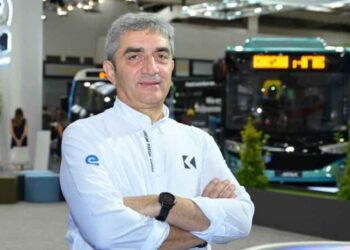General Motors Co. announced an investment of more than $7 billion in four Michigan manufacturing sites, creating 4,000 new jobs and retaining 1,000, and significantly increasing battery cell and electric truck manufacturing capacity.
This is the single largest investment announcement in GM history. The investment includes construction of a new Ultium Cells battery cell plant in Lansing and the conversion of GM’s assembly plant in Orion Township, Michigan for production of the Chevrolet Silverado EV and the electric GMC Sierra, GM’s second assembly plant scheduled to build full-size electric pickups.
“Today we are taking the next step in our continuous work to establish GM’s EV leadership by making investments in our vertically integrated battery production in the U.S., and our North American EV production capacity,” said Mary Barra, GM Chair and CEO. “We are building on the positive consumer response and reservations for our recent EV launches and debuts, including GMC HUMMER EV, Cadillac LYRIQ, Chevrolet Equinox EV and Chevrolet Silverado EV. Our plan creates the broadest EV portfolio of any automaker and further solidifies our path toward U.S. EV leadership by mid-decade.”
These investments are the latest step toward accelerating GM’s drive to become the EV market leader in North America by 2025. The Orion and Ultium Cells Lansing investments announced today will support an increase in total full-size electric truck production capacity to 600,000 trucks when both Factory ZERO and Orion facilities are fully ramped. GM has been the leader in U.S. full-size truck deliveries over the past two years. In addition, the company is investing in its two Lansing-area vehicle assembly plants for near-term product enhancements.
As previously announced, GM will continue to strategically manage the conversion of its North American manufacturing footprint through unprecedented speed, flexibility and precision. Through site conversion and new facilities, GM is uniquely positioned to stay ahead of the growing demand for electric vehicles while balancing the need to aggressively compete to win in today’s market with strong products.
Today’s announcements include investments in the following locations:
Orion Assembly for production of Chevrolet Silverado EV and electric GMC Sierra — GM is investing $4 billion to convert the facility to produce electric trucks using the GM-developed Ultium Platform, which gives the company the flexibility to build vehicles for every customer and segment. This investment is expected to create more than 2,350 new jobs at Orion and retain approximately 1,000 current jobs when the plant is fully operational. GM estimates the new jobs at Orion will be filled by a combination of GM transferees and new hires. Electric truck production, including the Chevrolet Silverado EV and electric GMC Sierra, will begin at Orion in 2024. The Orion investment will drive significant facility and capacity expansion at the site, including new body and paint shops and new general assembly and battery pack assembly areas. Production of the Chevrolet Bolt EV and EUV will continue during the plant’s conversion. Site work begins immediately.
New Ultium Cells battery cell plant at Lansing site — GM and LG Energy Solution, via their Ultium Cells joint venture, are investing $2.6 billion to build Ultium Cells’ third U.S. battery cell manufacturing plant. This investment is expected to create more than 1,700 new Ultium Cells jobs when the plant is fully operational. Site preparations will begin this summer and battery cell production is scheduled to begin in late 2024. Ultium Cells Lansing will supply battery cells to Orion Assembly and other GM assembly plants.
Orion Assembly will become GM’s third U.S. assembly plant being transformed for production of Ultium-powered EVs. GM assembly plants in North America currently building, or being converted to build EVs, include Factory ZERO in Detroit and Hamtramck, Michigan; Spring Hill Assembly in Spring Hill, Tennessee; CAMI in Ingersoll, Ontario and Ramos Arizpe Assembly in Mexico. By the end of 2025, GM will have more than 1 million units of electric vehicle capacity in North America to respond to growing electric vehicle demand.
The Ultium Cells Lansing site represents GM’s third Ultium Cells battery cell manufacturing site in the U.S., following two Ultium Cells battery cell manufacturing plants being constructed in Ohio and Tennessee.
In addition to the EV-related investments in Michigan, GM is investing more than $510 million in its two Lansing-area vehicle assembly plants to upgrade their production capabilities for near-term products:
Lansing Delta Township Assembly — Investment is for production of the next-generation Chevrolet Traverse and Buick Enclave.
Lansing Grand River Assembly — Investment is for plant upgrades.
“These important investments would not have been possible without the strong support from the Governor, the Michigan Legislature, Orion Township, the City of Lansing, Delta Township as well as our collaboration with the UAW and LG Energy Solution,” added Barra. “These investments also create opportunities in Michigan for us to bring our employees along on our transition to an all-electric future.”
Vertically integrating battery assembly and converting existing assembly plants are at the core of GM’s strategy for scaling EV production in North America. GM projects it will convert 50 percent of its North American assembly capacity to EV production by 2030.
In addition to strategically adding battery cell and electric vehicle assembly capacity, GM is working to build a new supply chain via strategic supplier agreements for batteries and EV components, one that is expected to be scalable, more resilient, more sustainable and more North American-focused. These strategic supplier agreements include:
MP Materials to scale rare earth magnet sourcing and production in the U.S.
- VAC to build a new magnet factory in the U.S. to support EV growth.
- POSCO to build a new North America plant to process Cathode Active Material.
- GE Renewable Energy to serve as a source of rare earth and other materials.
- Wolfspeed to develop and provide silicon carbide power device solutions.
- Controlled Thermal Resources to develop a source of U.S.-based lithium through a closed-loop process with lower carbon emissions when compared to traditional processes.


































